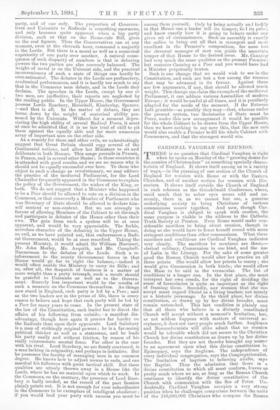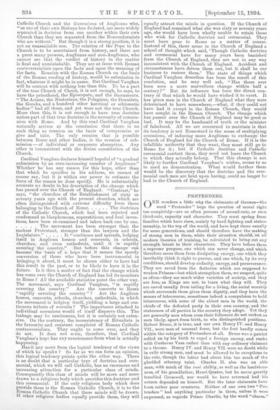CARDINAL VAUGHAN ON REUNION. T HERE is no question that Cardinal
Vaughan is right when he spoke on Monday of the " growing desire for the reunion of Christendom" as something specially charac- teristic of England. It shows itself among us in a variety of ways,—in the yearning of one section of the Church of England for reunion with Rome or with the Eastern Churches, and of another section for reunion with Dis- senters. It shows itself outside the Church of England in such schemes as the Grindelivald Conference, where, amid much that to sober eyes seems odd and un- seemly, there is, as we cannot but see, a genuine underlying anxiety to bring Christians of various communions nearer together. And now, though Car- dinal Vaughan is obliged to speak with caution, the same purpose is visible in the address to the Catholic Truth Society at Preston. Even Rome would make con- siderable sacrifices to bring about reunion, though in doing so she would have to fence herself round with more stringent conditions than other communions. What these sacrifices and conditions are Cardinal Vaughan indicates very clearly. The sacrifices he mentions are three,— clerical celibacy, Communion in one kind, and the use of Latin in the Liturgy. For the sake of some greater good the Roman Church would alter her practice on all three points. She would allow her priests to marry ; she would give Communion in both kinds ; she would allow the Mass to be said in the vernacular. The list of conditions is a longer one. In the first place, she must interpret her own creeds, for the right of deciding the sense of formularies is quite as important as the right of framing them. Secondly, any reunion that she can accept must regard Christ as a living teacher, not merely as a historic personage. In the third place, her divine constitution, as drawn up by her divine founder, must remain untouched. This last condition is plainly one that all those who believe in a divinely constituted Church will accept without a moment's hesitation, but, as not seldom happens with matters of universal ac- ceptance, it does not carry people much farther. Anglicans and Nonconformists will alike admit that no reunion would be tolerable which did not secure to the Christian Church her divine constitution as drawn up by her divine founder, But they are not thereby brought any nearer to an agreement upon what this divine constitution is. Episcopacy, says the Anglican. The independence. of every individual congregation, says the Congregationalist. The limitation of baptism to believing adults, says i the Baptist. Thus the admission that there is a divine constitution to which all must conform, leaves us pretty much where we are, so long as the Rom an Church continues to identify the divine constitution of the Church with communion with the See of Peter, Uri. doubtedly Cardinal Vaughan occupies a very strong position when he challenges comparison between the unity of the 240,000,000 Christians who compose the Roman Catholic Church and the dissensions of Anglicans who, "as one of their own Bishops has declared, are more widely separated in doctrine from one another within their own Church than they are separated from the Nonconformists who are without." But though it is a strong position, it is not an unassailable one. The relation of the Pope to the Church is to be ascertained from history, and there are a great many persons, Anglicans and non-Anglicans, who cannot see that the verdict of history in the matter is final and unmistakable. They are at issue with Roman controversialists upon the facts and upon the meaning of the facts. Reunion with the Roman Church on the basis of the Roman reading of history, would be submission in fact, whatever it might be in name. But Cardinal Vaughan will be content with nothing less than this. To be a part of the true Church of Christ, it is not enough, he says, to have the priesthood, the Episcopate, and the Sacraments. " The Arians, the Nestorians, the Pelagians, the Donatists, the Greeks, and a hundred other heretical or schismatic bodies " had all these, and yet were not the true Church. More than this, it is not enough to have true doctrine unless part of that true doctrine is the necessity of commu- nion with Rome. And by this road Cardinal Vaughan naturally arrives at the conclusion that there is no such thing as reunion on the basis of compromise or give and take. The only reunion that is possible between Rome and other bodies, is the reunion of sub- mission — of individual or corporate absorption. Any other is inconsistent with the divine constitution of the Church.
Cardinal Vaughan declares himself hopeful of "a gradual submission by an ever-increasing number of Anglicans." Whether he has any reason for this hope, other than that which he specifies in his address, we cannot of course say, but it is within our power to estimate the force of the reason he does specify. He is substantially accurate no doubt in his description of the change which has passed over the Church of England. "Contrast," he says, " the churches of the Establishment of sixty or seventy years ago with the present churches, which are often distinguished with extreme difficulty from those belonging to the Church of Rome The doctrines of the Catholic Church, which had been rejected and condemned as blasphemous, superstitious, and foul inven- tions, have been re-examined and taken back one by one. . . — . The movement has been stronger than the rankest Protestant, stronger than the lawyers and the Legislature." . . . . . It "continues and spreads, lodging itself in Anglican homes and convents, in schools, churches, and even cathedrals, until it is rapidly covering the country." But before this change can become the basis of a hope that it means the speedy conversion of those who have been instrumental in bringing it about, it must be shown either to have had this result in the past, or to be likely to have it in the future. Is it then a matter of fact that the change which has come over the Church of England has led its members to Rome ? All the available statistics point the other way. The movement, says Cardinal Vaughan, " is rapidly covering the country." Are the converts to Rome "rapidly covering the country" ? Are the Anglican homes, convents, schools, churches, cathedrals, in which the movement is lodging itself, yielding a large and con- tinuous tribute of recruits ? The importance attached to individual secessions would of itself disprove this. The leakage may be continuous, but it is certainly not exten- sive. On the contrary, the inconsistency of Ritualists is the favourite and constant complaint of Roman Catholic controversialists. They ought to come over, and they do not. It does not stern, therefore, that Cardinal Vaughan's hope has any countenance from what is actually happening.
Has it any more from the logical tendency of the views of which he speaks ? So far as we can form an opinion, this logical tendency points quite the other way. There is no doubt that a particular type of doctrine and cere- monial, which we will call Catholic, has an enormous and increasing attraction for a particular class of minds. Consequently this class of minds will be more and more drawn to a religious body which provides this doctrine and this ceremonial. If the only religious body which does provide them is the Roman Catholic Church, it is to the Roman Catholic Church that these minds will be drawn. If other religious bodies equally provide them, they will equally attract the minds in question. If the Church of England had remained what she was sixty or seventy years ago, she would have been wholly unable to retain those who wish for Catholic doctrine and ceremonial. They must have gone to Rome as a matter of course. Instead of this, there arose in the Church of England a school of thought which said, Though Catholic doctrine and ceremonial have for many years been banished from the Church of England, they are not in any way inconsistent with the Church of England. Accident and circumstances have driven them out, but it shall be our business to restore them.' The state of things which Cardinal Vaughan describes has been the result of this resolution, and he may well ask, "Has there ever been seen a more marvellous change within half a century?" But its influence has been the direct con- trary of that which he would have wished it to exert. It has given men in the Church of England what they were determined to have somewhere,—what, if they could not have had it except in the Roman Church, they would have sought in the Roman Church. The change which hail passed over the Church of England may be good or bad. It may be the handmaid of truth or the minister of falsehood. All we are concerned to maintain is that its tendency is not Romeward in the sense of multiplying secessions, of inducing more Anglicans to exchange the Church of England for the Church of Rome. If it is the infallible authority that they want, they must still go to Rome for it ; but if Catholic doctrine and Catholic ceremonial content them, they need not leave the Church to which they actually belong. That this change is not likely to further Cardinal Vaughan's wishes, seems to us to need no demonstration. What would further them would be the discovery that the doctrine and the cere- monial such men are bent upon having, could no longer be had in the Church of England.



































 Previous page
Previous page